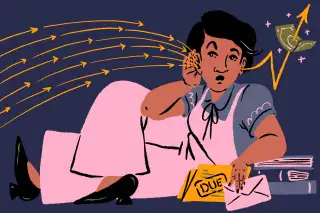The Best Books to Help You Pay off Debt, According to Finance Experts

More of us are shouldering a greater debt burden than ever before. According to the Federal Reserve Bank of New York, total household debt rose by $192 billion to a total of $13.9 trillion in the second quarter of 2019, breaking the previous record of $12.7 trillion in outstanding debt accumulated as of the third quarter of 2008 — not a flattering comparison.
In the last quarter of 2018 alone, Americans racked up an additional $26 billion on credit cards, and more than half of the Americans who use credit cards have credit card debt.
So what are the best ways to pay off credit card debt? And what are the smartest strategies for paying off debt in general? First off, it's important to take the long view concerning debt — and understand that not all debt is bad.
“People need to take a more holistic approach so that they don’t look at debt as dangerous or unhealthy but rather a tool that can help them achieve their life goals,” says Colin Slabach, assistant professor of retirement at The American College of Financial Services. He adds this important caveat: “If not managed appropriately, debt can be a burden and cause unnecessary stress in one’s life.”
So if you’re one of the 55% with credit card debt, or if student loans, medical bills or other circumstances have put your personal balance sheet in the red, Slabach and other financial experts recommend the following books as good sources for advice on how to pay off debt — and how to achieve a debt-free life.
The Index Card: Why Personal Finance Doesn’t Have to be Complicated by Helaine Olen and Harold Pollack
This book grew out of a 2013 blog post by University of Chicago professor Harold Pollack that went viral. Micah Hauptman, financial services counsel at the Consumer Federation of America, says it expands on the core financial principles Pollack scrawled on that famous index card with insights to help people put those in practice.
“It provides clear explanations of what can often be complicated topics, coupled with simple and easily implementable strategies to help reduce debt and increase savings,” he says.
The Financial Wisdom of Ebenezer Scrooge: Transforming Your Relationship with Money by Ted Klontz, Brad Klontz and Rick Kahler
While not a how-to on paring down debt, The Financial Wisdom of Ebenezer Scrooge is worthwhile for exploring the psychological underpinnings of what often gets us into debt in the first place, Slabach says. As the title indicates, it looks at money mistakes through the tale of Charles Dickens’ classic miser.
Slabach says the book is useful for introducing the idea of “money scripts,” subconscious attitudes that inform our behaviors about money. “The book provides two extremes about people with misconceptions about money,” he says, adding that Scrooge “is powerful because it helps you diagnose any misconceptions you may have about money.”
Nudge: Improving Decisions About Health, Wealth, and Happiness by Richard Thaler
“Nudge takes an entertaining approach to uncover how people make decisions,” says Brian Walsh, manager of financial planning at SoFi. Behavioral economist and Nobel Prize winner Richard Thaler makes economics interesting by plumbing below the surface to find out why people don't behave rationally when it comes to money — and how that can impact your ability to pay off debts.
"You will pick up tons of fun facts, but more importantly, start to understand how you make decisions and therefore how you can influence your own behavior to get out of debt," Walsh says.
I Will Teach You To Be Rich by Ramit Sethi
Think of it like boot camp for your bank account: The six-week program in Ramit Sethi's I Will Teach You to Be Rich, which was republished in a new edition in 2019, aims to whip your finances in shape helping you develop a more healthy relationship with money.
“Sethi stresses the importance of conscious spending — spending in ways that provide us meaning and value, while cutting costs on everything else,” says Hauptman, quoting one of the book’s most famous maxims: "Spend extravagantly on things you love, cut costs mercilessly on things you don't love."
With an undeniably eye-catching title, I Will Teach You To Be Rich has won praise in particular for appealing to and being relevant for young adults taking charge of their financial futures.
Naked Economics: Undressing the Dismal Science by Charles Wheelan
If you feel like you don’t know enough about personal finance to strategically tackle your debt, Walsh says Naked Economics will lay the groundwork of financial literacy you need to get and stay out of debt — no prior expertise needed.
“Naked Economics takes a jargon-free approach to explaining basic economic issues. You don’t need any financial or economic background to read this book,” Walsh says.
We’ve included affiliate links into this article. Click here to learn what those are.